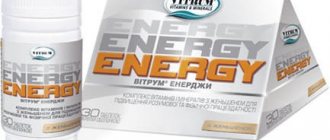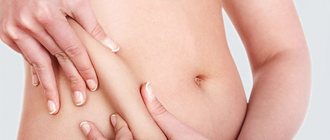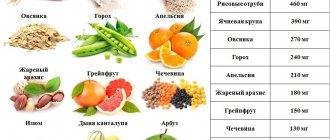Coenzyme Q10 (ubiquinone) is used in medicine, cosmetology, sports and bodybuilding. It belongs to the class of active coenzymes involved in all biochemical processes and is also found in the heart, liver, and kidneys. According to doctors, its concentration in the body decreases with age - by the age of 60 only 50% remains. Therefore, information about the indications, dosages and rules for using Coenzyme Q10 will be useful for people of all ages.
Doctor's Best, High Absorption CoQ10, with BioPerine, 100 mg, 60 Veggie Caps
★★★★☆
from 884 ₽
More details
Properties of coenzyme Q10
Ubiquinone is found in the inner membrane of mitochondria and is involved in the respiratory chain, which provides the body with energy. If there is a lack of this substance, the process of its formation is interrupted.
Coenzyme Q10 is synthesized every day in cells and enters the body through food or supplements. It has a positive effect on the condition of the skin and hair, increases the synthesis of endogenous collagen and elastin, as well as:
- slows down the natural aging process;
- reduces the number of wrinkles;
- increases endurance, improves muscle function;
- accelerates metabolism and lipolysis, helps to lose weight;
- supports heart function, provides the myocardium with energy;
- reduces blood cholesterol levels, protects against atherosclerosis;
- improves cognitive abilities, prevents the development of degenerative processes in the brain;
- has antioxidant activity, protects cellular and mitochondrial DNA from mutations.
Coenzyme Q10 is useful for women during pregnancy planning. The substance normalizes reproductive function and prepares the body for hormonal changes.
BEGINNERS
So, when ubiquinone transfers electrons (donates them to the carrier during a chemical reaction), it releases protons. Scientists call this COENZYME FUNCTION
ubiquinone. In the process of accepting these electrons, ubiquinone neutralizes free radicals. This, in turn, is called
ANTIOXIDANT FUNCTION
.
In fact, COENZYME Q10 (UBIQUINONE) is a “ubiquitous” chemical compound of cells, which is a necessary component for electron transport during the AEROBIC energy exchange reaction
. Because These reactions mainly take place in the mitochondria, which is where most of this substance is located.
CONCLUSION: A sufficient amount of coenzyme inhibits oxidation and reduces ATP deficiency.
I often hear confusion about the names of Coenzyme Q10
and
ubiquinone
. Even experts sometimes believe that these are synonyms. This is not true at all because they are two different forms (reduced and oxidized) of the original substance. In general, the picture, as I understand it, looks like this:
- Q10 + reduction = UBIQUINONE (reduced form of Q10)
- UBIQUINONE + oxygen =Q10 (oxidation reaction)
In other words, we essentially have two different components that transform into one another and back again during chemical reactions. COENZYME Q10 is capable of converting into UBIQUINONE
. To complete the picture, it is important to understand that there is one more (third) reaction due to which our body can create Q10 from scratch:
- MEVALONIC K-TA + reaction = Q10
In other words, coenzyme Q10 is so important for our body that we have the opportunity to obtain coenzyme on our own. Moreover, normally, the coenzyme is present in cells in sufficient quantities. But the older a person gets, the lower the natural concentration of this important substance.
Don’t forget that the most coenzyme Q10 (ubiquinone) is found in those tissues that work the most
, because they need the most cheap energy. Can you guess where the concentration of ubiquinone is highest? THIS IS THE HEART! Because the heart is first and foremost a muscle. And not the simple one, but the one that works the most. After all, even when you go to bed today, it will continue its work in your sleep. That is why coenzyme Q10 is actively used in cardiology to treat heart diseases. But let's talk about the arguments FOR and CONS in order.
Indications
Doctors say that the amount of coenzyme gradually decreases from the age of 30. Therefore, drugs containing it are recommended to be taken periodically even by healthy people to prevent diseases.
Attention! The main symptoms of coenzyme deficiency are constant fatigue, drowsiness, anxiety, pressure surges, and early skin aging.
Drugs with coenzyme are also used as part of complex therapy for a number of diseases and conditions:
- arterial hypertension, ischemic heart disease, atherosclerosis, heart failure;
- peripheral circulatory disorders;
- muscle wasting;
- chronic diseases of the respiratory system, bronchial asthma;
- metabolic syndrome, obesity, diabetes mellitus;
- Alzheimer's disease, Parkinson's disease, senile dementia;
- decreased immunity, frequent infectious diseases.
Watch a video on how to lose weight with Coenzyme Q10:
Application in sports and bodybuilding
Preparations with this substance are especially popular among men involved in weightlifting and strength sports. Coenzyme helps to quickly recover from physical activity, prepare the body for competitions and improve results. This substance also supports male strength.
These supplements have also been proven to be beneficial for bodybuilders. Dietary supplements accelerate the growth of muscle tissue, metabolism and burn excess fat.
Effect on the body
Being a fat-soluble coenzyme, coenzyme is easily absorbed by tissues and organs when it enters them from the outside. Its functions are similar to vitamin compounds, which is why it is called a pseudovitamin or vitamin Q10.
It is found in maximum quantities in organs that incur the greatest energy costs, such as the heart, kidneys and liver.
Additional nutrient intake triggers the following processes:
- increases endurance in athletes;
- improves physical activity in old age;
- reduces dopamine loss, partially preserving reflex functions in Parkinson's disease;
- strengthens tissues and prevents the destructive effects of ultraviolet radiation on the skin, improves its elasticity and regeneration;
- reduces damage to the heart muscle and increases the lifespan of other organs;
- by dilating blood vessels, lowers blood pressure and increases blood flow if it is obstructed;
- increases the ratio of insulin and proinsulin, reduces the amount of glycohemoglobin in the blood, reducing the risk of diabetes complications;
- increases protein activity in muscle tissue, reducing fatigue and increasing endurance during intense contractions (source - NCBI - National Center for Biotechnology Information).
Contraindications
The following conditions and diseases are contraindications to the use of Coenzyme Q10:
- individual intolerance to the main or auxiliary components of the supplement;
- decompensated diseases of the cardiovascular system;
- renal or liver failure;
- children up to 14 years of age.
Attention! An absolute contraindication for taking coenzyme for women is pregnancy and breastfeeding.
Advantages and disadvantages
Among the positive aspects of Q10:
- tangible improvement in the condition of patients with cardiovascular diseases;
- Possibility of use for prevention and without a prescription;
- complex effect on all organ systems;
- acceleration of postoperative rehabilitation;
- slowing down the growth of cancerous tumors;
- increased endurance and decreased fatigue;
- safety of use if recommendations are followed.
Negative effects only occur if directions are not followed.
The drug does not have a toxic effect on the body, being a natural supplement.
But it is best absorbed with a daily consumption of no more than 500 mg in complex therapy of the disease. Exceeding the dose leads to digestive upset, but does not have other pronounced side effects, even with long-term use. In some cases, excessive dosages can cause acceleration of the aging process, sleep disturbances, or dermatological skin rashes.
The best drugs
Many pharmaceutical companies produce vitamin supplements with coenzyme, as well as single preparations and complex dietary supplements. Most drugs contain ascorbic acid and tocopherols, fatty acids, and plant bioflavonoids.
TOP 6 dietary supplements based on coenzyme Q10:
★★★★☆
Doctor's Best, High Absorption CoQ10 with BioPerine, 100 mg, 60 Veggie Caps
874 ₽
More details
★★★★☆
Doctor's Best, Highly Absorbable CoQ10 with BioPerine, 100 mg, 360 Vegetarian...
3 557 ₽
More details
★★★★☆
Doctor's Best, High Absorption CoQ10 with BioPerine, 100 mg, 120 Veggie Caps
1 423 ₽
More details
★★★★☆
California Gold Nutrition, CoQ10, 100 mg, 30 Veggie Caps
395 ₽
More details
★★★★☆
California Gold Nutrition, CoQ10, 100 mg, 120 Vegetarian Softgels
1 026 ₽
More details
★★★★☆
California Gold Nutrition, CoQ10, 100 mg, 360 Vegetable Softgels...
2 842 ₽
More details
Where can I buy
Some medications can be found in pharmacies or online health food stores.
But their prices for supplements can be several times higher, so we recommend purchasing dietary supplements on the iHerb website. Advantages of iHerb:
- a wide range of capsules and tablets Coenzyme Q10;
- the cost of drugs is 30-50% lower than the pharmacy price;
- providing several delivery methods;
- ratings and reviews of supplements from real customers;
- qualified support service.
Attention! Our readers can take advantage of a -10% discount on their first order from iHerb. To activate the discount, you need to enter the promotional code AGK4375 in the special field in the cart or follow the link.
Rules of application
The optimal dosage of Coenzyme Q10 per day for adults is 1 mg/kg, on average 60 mg per day. For the treatment of cardiac pathology, the daily dose can be increased by 2 times, but only after the doctor’s permission. Dosages recommended for athletes and bodybuilders are 200-400 mg of ubiquinone per day.
It is recommended to take 1 tablet/capsule with food or 30 minutes before meals. morning and evening, washed down with water. It is advisable to combine the intake with the consumption of foods with a high fat content, as they accelerate the absorption and assimilation of the enzyme. According to the instructions for use, the duration of the course of taking Coenzyme Q10 is 1-2 months.
Attention! Most medications provide a daily dosage of Q10 in 1-2 capsules/tablets.
How to take Coenzyme Q10
And here’s a bonus for you with one interesting recommendation on coQ10 dosages, which I once upon a time received in a personal message from nutritionist Tatyana Rybnikova (I once mentioned her on my blog at the dawn of my activity - Tatyana supported me in difficult times
).
Coenzyme Q10 for prevention
- up to 30 years – 50 mg per day;
- from 30 to 50 years old, healthy people: 100 mg. At the same time, for women in the first month of taking it, take 100 mg 3 times a day, and then we switch to the standard dose of 100 mg per day.
Coenzyme Q10 for medicinal purposes
To correct various conditions, CoQ10 is taken in a dose of 300 mg.
As Tatyana wrote, these are the recommendations of one stellar American doctor. I already did this - in one of the months I just took CoQ10 not 100 mg, but 300 mg, then switched to the usual dose.
Well, and the Sundesa shaker
in my parcel. The exact same shaker can be seen in many of my photos. I took a spare of it, otherwise I keep trying to lose the shaker, and their variety of colors disappeared somehow from iHerb, but I need exactly white, with white transparent plastic, so that the color of the drink can be seen. The funny thing is that once a girl in the audience asked me where I bought such a shaker - she also liked that the plastic was transparent.
That's it, everyone enjoys the parcels!











